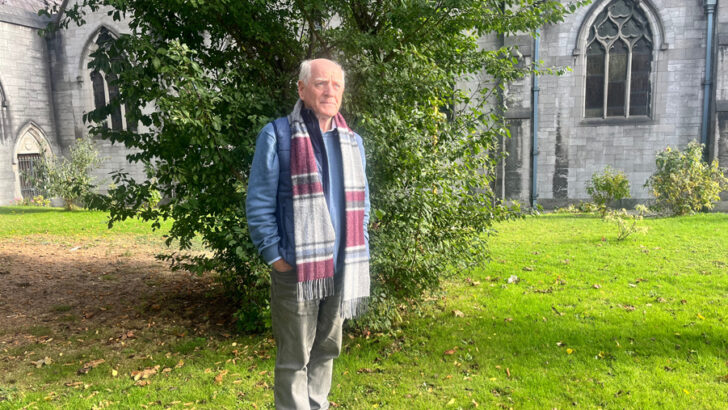Fr Martin’s life is a proof of the Church’s missionary spirit that continues to inspire priests, religious, and laity, says Renata Milán Morales
“May that missionary spirit never decline in the hearts of Irish priests, whether members of missionary institutes or of the diocesan clergy or of religious congregations devoted to other apostolates,” said St John Paul II to the audience in Maynooth in 1979, encouraging all attendants to live the missionary call of the Church.
Fr Martin Hunter’s life as a missionary has been marked by faith, commitment, and service across various countries and cultures. His journey reflects the Church’s mission as described in Ad Gentes from the Second Vatican Council: “The pilgrim Church is missionary by her very nature, since it is from the mission of the Son and the mission of the Holy Spirit that she draws her origin, in accordance with the decree of God the Father.”
After seven years of Dominican formation, Fr Martin was assigned to St Aengus Parish, Tallaght. Reflecting on his early ministry, he says, “There I learnt a lot: how to baptise, marry, and sadly, to bury. Also, how to sit and teach seven, eight-year-olds all about Holy Communion.”
Jessica
In preparing children for their First Communion, he created an imaginary friend, Jessica, to help them understand their faith. “Jessica was very sick, and we were all invited to write get-well cards. A whole Christian Communion Community was created around Jessica.”
However, his ministry soon took a new direction. “With my first year hardly completed, I received a phone call from the Provincial, Fr Damian Byrne OP, assigning me to our Retreat Centre to take over the school retreat programme.” Lacking experience with this age group, Fr Martin was assisted by two Dominican sisters, Maire and Geraldine, who helped him renew the youth retreat dynamic. “My Dominican sisters, with international missionary experience, were to be my professors in this new evangelisation mission.”
During the four years in Portugal, my eyes, ears, and heart were opening to an extraordinary and challenging world”
Fr Martin’s next assignment took him to Portugal, where language and cultural challenges were present. “I tried to get a grip on the language but failed. I learnt to ‘say’ the Mass perfectly in Portuguese, but talking to the locals was a problem.” Despite this, he focused on ministering to the English-speaking community, working with international schools and foreigners whose first language was English. His work with the Irish Dominican Sisters at an international school further strengthened his pastoral ministry. “During the four years in Portugal, my eyes, ears, and heart were opening to an extraordinary and challenging world.”
After Portugal, Fr Martin was given the opportunity to serve in Argentina. “My motivation to opt for Argentina was more personal than provincial.” Despite being unfamiliar with Spanish or the mission’s specifics, he soon found his way in Paraná. “Paraná won my heart because I arrived in a time of cultural celebration: folklore, music, dance, and asado. But the reality of the barrio in the morning was clear that people struggled for work.”
Challenging
His work in Paraná, particularly in the San Agustin barrio, was both challenging and rewarding. The Irish Dominican community, including the Dominican sisters, played a key role in building Christian communities and addressing the needs of the poor. Family catechesis, led by the sisters, was especially important in strengthening these communities. Fr Martin recalls a moving moment early in his time in San Agustin: “Someone in the parish died. I was nervous, but Sr Caitriona OP took over and guided the prayer. She invited the family to make one last gesture of farewell, drawing the sign of the cross on the deceased’s forehead. I did too. If there was ever an evangelising moment of grace, peace, and love, that was one.”
Thanks to the generosity of the Irish Dominicans, ‘Radio Santo Domingo’ became a reality, offering spiritual and practical support to the people”
After 33 years in Argentina, Fr Martin’s mission ended in 2021. “A very difficult goodbye had to be endured. Argentina was socially in dire straits, and our farewell was sore.” From there, he was sent to Chimbote, Peru, where social conditions were even worse. “The city of Chimbote was pretty ‘wild west’ territory,” with poverty, unemployment, and a difficult environment.
In Chimbote, Fr Martin became involved in a Dominican project focused on social communication, helping establish a radio station to serve the community. “Thanks to the generosity of the Irish Dominicans, ‘Radio Santo Domingo’ became a reality, offering spiritual and practical support to the people. Our evangelising reaches farmers in the distant mountains and fishermen in Chimbote who need Good News.”
Fr Martin’s journey then took him to Uruguay, where he became involved in Lectio Divina, a form of contemplative Scripture reading. “I had the good fortune to obtain a diploma in Lectio Divina under the tutelage of Carlos Mesters.” This practice became central to his ministry in Montevideo and other parts of Uruguay.
Fr Martin’s final years of missionary work were spent back in Argentina, this time in Buenos Aires. His pastoral work took him into the barrios, including the parish of Santa Brigida de Irlanda. “The Irish Dominican Sisters, alongside some Argentinians, lived among the people and promoted community building and spirituality.” These years were marked by a deep connection to Dominican spirituality, which had been at the heart of his ministry from the beginning.
Important
“What is most important is the mission. It has been gifted to me to mission as an Irish Dominican.” His story shows the missionary spirit of the Church – a spirit that has driven him across borders and cultures, bringing the Gospel to countless people along the way.
In the words of St John Paul II, “May a spirit of partnership grow between the home dioceses and the home religious congregations in the total mission of the Church, until each local diocesan church and each religious congregation and community is fully seen to be ‘missionary of its very nature’.” Fr Martin’s life is a proof of the Church’s missionary spirit, one that continues to inspire priests, religious, and laity.


 Renata Milán Morales
Renata Milán Morales Fr Martin Hunter OP
Fr Martin Hunter OP 